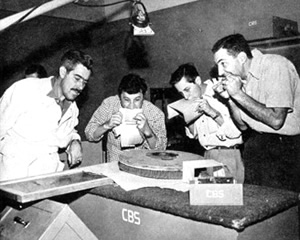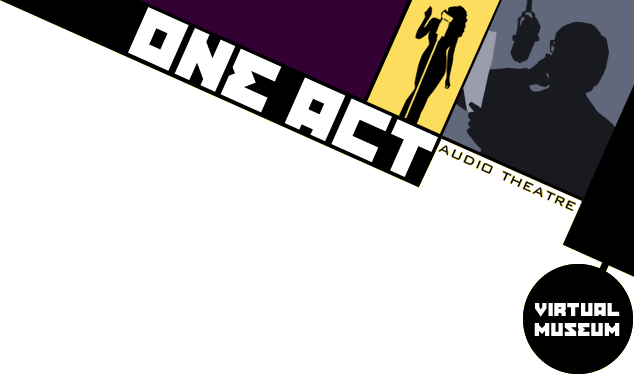Virtual Museum
Escape to Three Skeleton Key
ESCAPE debuted over the CBS network in July 1947 as a Summer replacement for the Lux Radio Theater, and ran for seven years, broadcasting its final show in September 1954. Unlike its counterpart adventure series SUSPENSE (a continuous run on CBS from June 1942 to September 1962), ESCAPE never settled into a reliable time slot, being moved around to fill CBS' needs. It was even off the air for a few long gaps while other programming took its place. Still, thanks to solid scripts, excellent acting and high production values (for its relatively low budgets), ESCAPE is widely considered one of the best radio action adventure series produced during radio’s “golden” age.
Each week the gruff voice of William Conrad queried listeners: “Tired of the daily grind? Ever dreamed of a life of romantic adventure? Want to get away from it all? We offer you... ESCAPE!” Add a few bars from Moussorgsky's Night on Bald Mountain as a theme, and the proper mood was set. Whether the show you were about to hear was classic adventure, western, horror, or science fiction, one thing all scripts had in common: On ESCAPE, desperate characters always faced life-and-death situations.
The stories heard on ESCAPE were based on original works by notable radio playwrights along with adaptations of classic adventure (Rudyard Kipling, Arthur Conan Doyle, HG Wells), horror (Edgar Allen Poe, Lu Xun), and contemporary science fiction (Ray Bradbury). But it is a James Poe adaptation of a 1937 short story published in the magazine Esquire by little known French writer George Toudouze that is one of the best stories in the series, if not in all of “old time radio.” The story, often referred to as “the one with the rats” is, of course, Three Skeleton Key. And even though Toudouze wrote many books and plays on subjects as varied as the sea, art and architecture, or French Naval History, it is Three Skeleton Key for which he is still remembered today. And when Vincent Price stepped behind the microphone on March 17, 1950 as Jean, a classic was born.
Three Skeleton Key proved very popular with audiences, and in response to hundreds of requests, it was produced three times over the years on ESCAPE. In fact, the Vincent Price production was the second; Elliott Reid was Jean for its debut (November 1949), and Ben Wright in the third (August 1953). Then when ESCAPE left the air, 3SK was produced on SUSPENSE several times, with slight script modifications to accommodate longer commercial breaks, and not unexpected cast changes (even Conrad took a turn as Jean). Price was a big star now, commanding top dollar, but again due to popular demand, he was paid to reprise his classic role at the microphone in 1956 and 1958. Almost universally, the 1956 show seems to be considered the best preserved in sound quality; however, it is the March 1950 Price version that is considered the finest rendition.
 (left to right) Escape! producer William Robson with sound effects team Bill Gould, Cliff Thorsness and Ross Murray.
(left to right) Escape! producer William Robson with sound effects team Bill Gould, Cliff Thorsness and Ross Murray.Thorsness passed away in 2002, but in 2001, when One Act announced our intention to create a nw Three Skeleton Key, his friend and protégé Tony Palermo contacted us and graciously passed along some of Cliff’s secrets behind creating these unforgettable horrific creatures. For fans and producers of audio theatre, it is comforting to know that Cliff’s irreplaceable collection of sound effects equipment (don’t call it “Foley”) now resides in the Museum of Television and Radio where it is still used today.
For the One Act production of Three Skeleton Key, we elected to quiet the piece down, and in this way it most definitely is more modern than an old time radio recreation. This is underlined by the sparse and haunting score composed and performed for us by John Clark Stiefel. Stiefel’s music perfectly captures the lonely isolation of the lighthouse and its occupants’ confrontation with a ghastly grim reaper, arriving in the form of a vast multitude of starving rats.
“Picture this place. A bare, black rock, one hundred fifty feet long, maybe forty wide. That’s at low tide. At high tide, just the lighthouse, rising one hundred ten feet straight up out of the ocean. And all around it the swirling water. Gray-green, scum dappled, warm as soup. And swarming with gigantic bat-like devil fish, great violet schools of Portuguese man-o-war... and yes, sharks, the big ones, the fifteen footers. And if that weren’t enough there was a hot, dank rotten smelling wind that came at us day and night off the jungle swamps of the mainland. A wind that smelled like... death. A wind that smelled the slow and frightful death that came one night to this bare, black rock.”
So in the words of our friend, Claude McAlistair, “sit back, relax, and turn off the lights... if you dare.”

 Learn more about the incomparable Vincent Price
Learn more about the incomparable Vincent Price